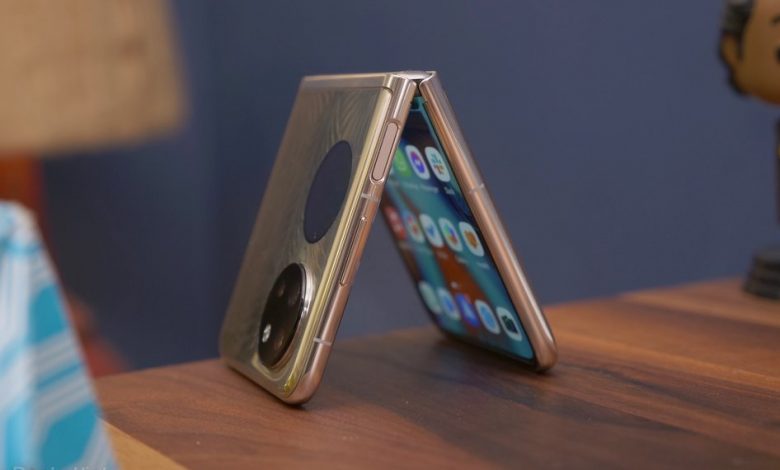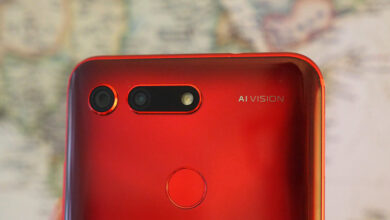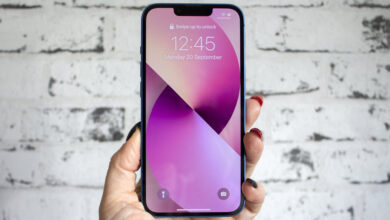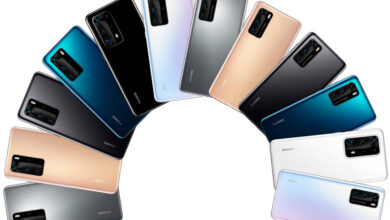Huawei P50 Pocket initial review: So shiny!

[ad_1]
(Pocket-lint) – For the most part, in the foldable smartphone market, most manufacturers started off with the book style approach. This meant a large screen – almost tablet sized – that you can fold to fit in your pocket. That includes Huawei, with its Mate X series of phones.
Of all the big names, it was Samsung who really championed the idea of a 21st century flip phone: one that took a smartphone-sized screen and let you fold it in half. The result was an incredibly compact, portable phone. It’s a really appealing form factor, and so it’s no surprise to see other manufacturers hopping on this emerging style. It’s also no surprise to see that Huawei is among the first to try its own approach.
The P50 Pocket takes that basic idea of a flip phone, and adapts it with a few design and feature tweaks.
Design
- 170 x 75.5 x 7.2mm unfolded
- 87.3 x 75.5 x 15.2mm folded
- Weighs 190g – glass and aluminium design
If there’s one stand out feature of the P50 Pocket, it’s the design. Especially when looking at the Premium Edition designed in collaboration with Iris Van Herpen.
This model isn’t only gold all over, but features an eye-catching fan design across the entire surface of the front and back glass. And it’s not a simple 2D pattern either. Each fan ‘blade’ is recessed into the outer glass, so it has texture too. That means it looks and feels like no other phone currently on the market.

Like the P50 Pro, Huawei has made the camera system very much part of the entire aesthetic, by making it completely round and sticking it next to an identically-sized round cover display. Just like the fan patterned glass, it certainly adds to that eye-catching appeal of the phone. And by pairing those two circles together, it ensures the round camera unit doesn’t just look awkward.
Apart from that, the design and styling is very reminiscent of the Samsung Galaxy Z Flip 3. However, there are some notable differences. For instance, when folded shut, it’s slimmer because Huawei’s method of curving the screen inside the hinge has meant the two halves of the phone can be almost completely flush. There’s no easily visible gap.

The method of curving the screen inside the hinge also means you don’t get that prominent single crease running along the display. More crucially, it means you’re not putting pressure along one single point, which means the panel should last more folds.
What we did notice was that the hinge feels a little looser and ‘springier’ than Samsung’s approach, and so it doesn’t seem to want to hold as rigidly at set angles. Sometimes, if we quickly tried to set it down at a 90-degree angle, it would just pull itself back straight. So while the aluminium frame and hinge covering seems strong and durable, that hinge design could be a bit more sturdy we think.
However, the phone is also noticeably wider and taller than the Samsung model, so Huawei has been able to put a bigger screen on the inside (more on that later).
There’s no official water or dust resistance, but the phone does feature the buttons you’d expect to find. There’s a physical fingerprint sensor in the side – which doubles as the wake/sleep button – plus the volume rocket switch. Both built into an aluminium frame that’s very shiny.
Displays
- 6.9-inch foldable OLED main display
- 1188 x 2790 resolution – 21:9 – 120Hz refresh
- Round 1.04-inch – 340 x 340 OLED cover display
By any calculation, a 6.9-inch screen on a smartphone is a big screen. And that’s what you get in the P50 Pocket. At virtually 7-inches, you get an expansive, cinematic 21:9 ratio OLED panel with all the right specifications.

At nearly 450 pixels-per-inch, it’s a sharp screen, and all the text and fine details look crisp. It’s also capable of displaying 1 billion colours, giving it really wide colour gamut coverage. Plus, with 120Hz refresh rates, it can be incredibly smooth and fluid too.
We need more time to judge it properly, but our initial impressions are of a display which is bright, with vivid colours, but without that over saturated feel you often get from OLED screens. It seems well tuned. What’s more, it has really fine-tuned brightness levels, so it won’t just jump between bright and dim when adjusting brightness automatically. It gradually shifts, making it less jarring.
Then there’s the small screen on the outside which is – for all intents and purposes – the same kind of screen you’d get on a smartwatch, just smaller. It’s a completely round touch-sensitive OLED panel.

You can’t do a huge amount with it, but it is useful. It can be used to display a clock – with a background themed to match the one on your main display – as well as showing notifications, a weather widget and as a camera monitor for when you want to use the main cameras to take selfies.
Hardware and software
- Snapdragon 888 processor
- 8GB/256GB and 12GB/512GB RAM/storage
- 4000mAh battery – 40W wired charging
- EMUI 12 – no Google Play Services
Hardware and spec wise, the P50 Pocket has everything you’d want from a flagship phone. That does, of course, come with a slight caveat that it does, as long as you’re happy with the 2021 flagship processor. The Snapdragon 888 inside the P50 Pocket has since been superseded by the Snapdragon 8 Gen 1, and that’s what you’ll see in pretty much every other flagship Android phone in 2022.
That sits alongside a generous amount of RAM and storage. There are two variants here; one with 8GB RAM and 256GB storage and one with 12GB RAM and 512GB storage. This premium model comes with the latter combination, and so costs more than the lower memory variants.

For a flip phone it’s got a relatively beefy battery too. At 4000mAh, it’s got 700mAh more than the Samsung alternative, and will charge faster too thanks to support for Huawei’s 40W SuperCharge technology. There’s no wireless charging though, sadly.
In Europe, the phone will run EMUI 12, Huawei’s skin built on top of Android. As with any Huawei phone launched in recent years, it doesn’t come with Google Play Services, so you’ll need to be sure your needs are met by Huawei’s App Gallery and Petal Search before buying.
Cameras
- 40MP primary camera
- 13MP ultrawide
- 32MP ultra-spectrum camera
Huawei’s never exactly been afraid to try new things with its camera systems. It was among the first to adopt night mode photography, AI scene processing, the periscope zoom camera, and a few other technologies to boot. With the P50 Pocket, it’s trying something a bit unconventional.

Alongside the usual main and ultrawide camera duo, there’s an ultra-spectrum camera. This – according to Huawei – can capture wavelengths invisible to the human eye, and has enabled a new ‘Fluorescence’ feature. Shooting at night time or in low light, this mode gives objects a bright, neon-like appearance.
It’s probably too soon to call it a gimmick, and it could enable some creativity previously unavailable on smartphones, but we’ll have to test it further to see how effective it is.
From a design perspective, the P50 Pocket is quite different in approach to what we’ve seen so far – particularly when compared to Samsung’s Z Flip 3. The round screen on the cover, and the textured, patterned finish make it very unique-looking.
But what we can’t get away from is the price. Where Samsung has been able to bring its flip phone down to a palatable price – no different to most flagship phones – the Huawei P50 Pocket is incredibly expensive still. And for those of us in western markets – the lack of Google Play Services means it may not be all that practical for most people.
Writing by Cam Bunton.
[ad_2]
Source link





